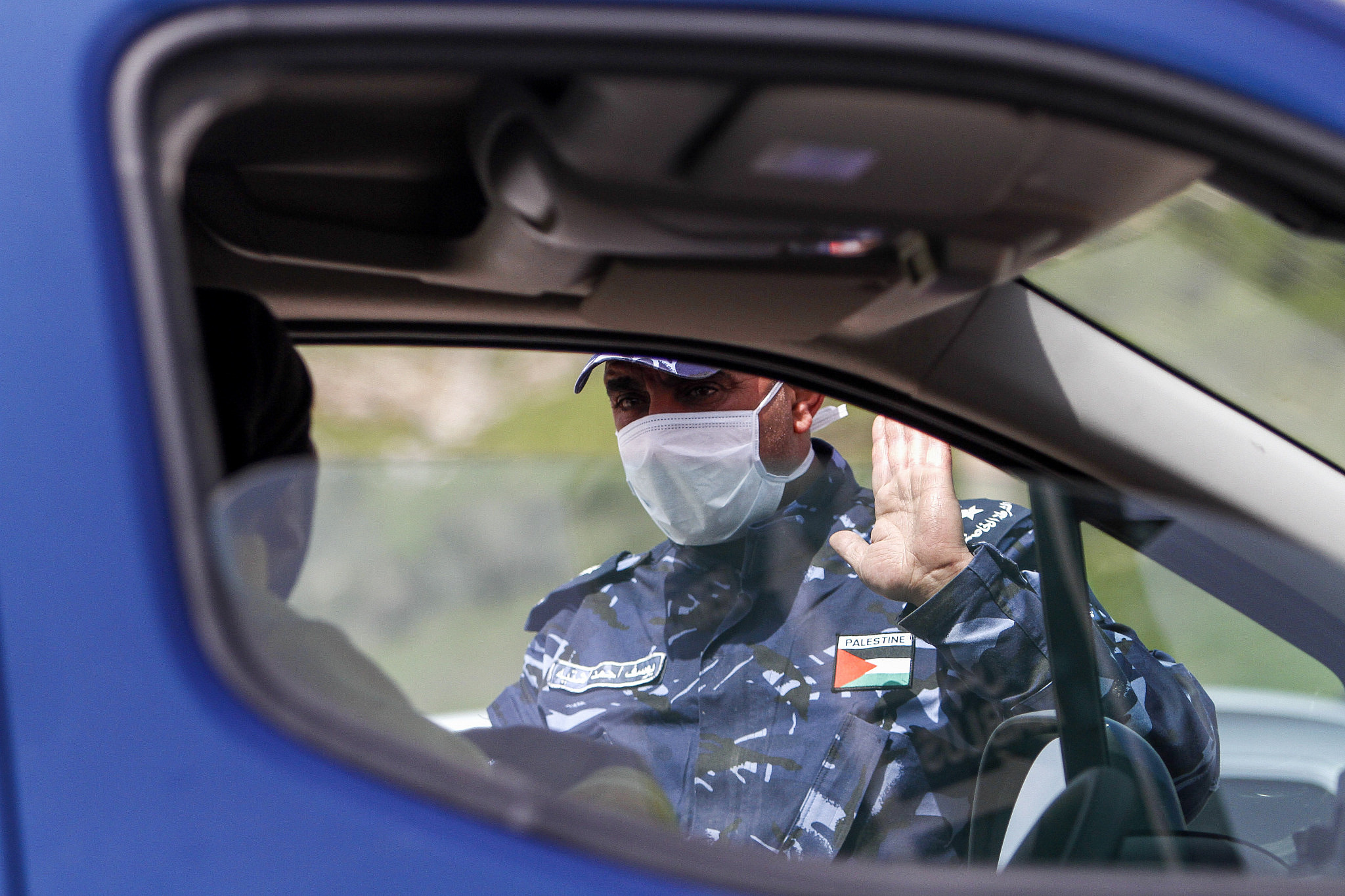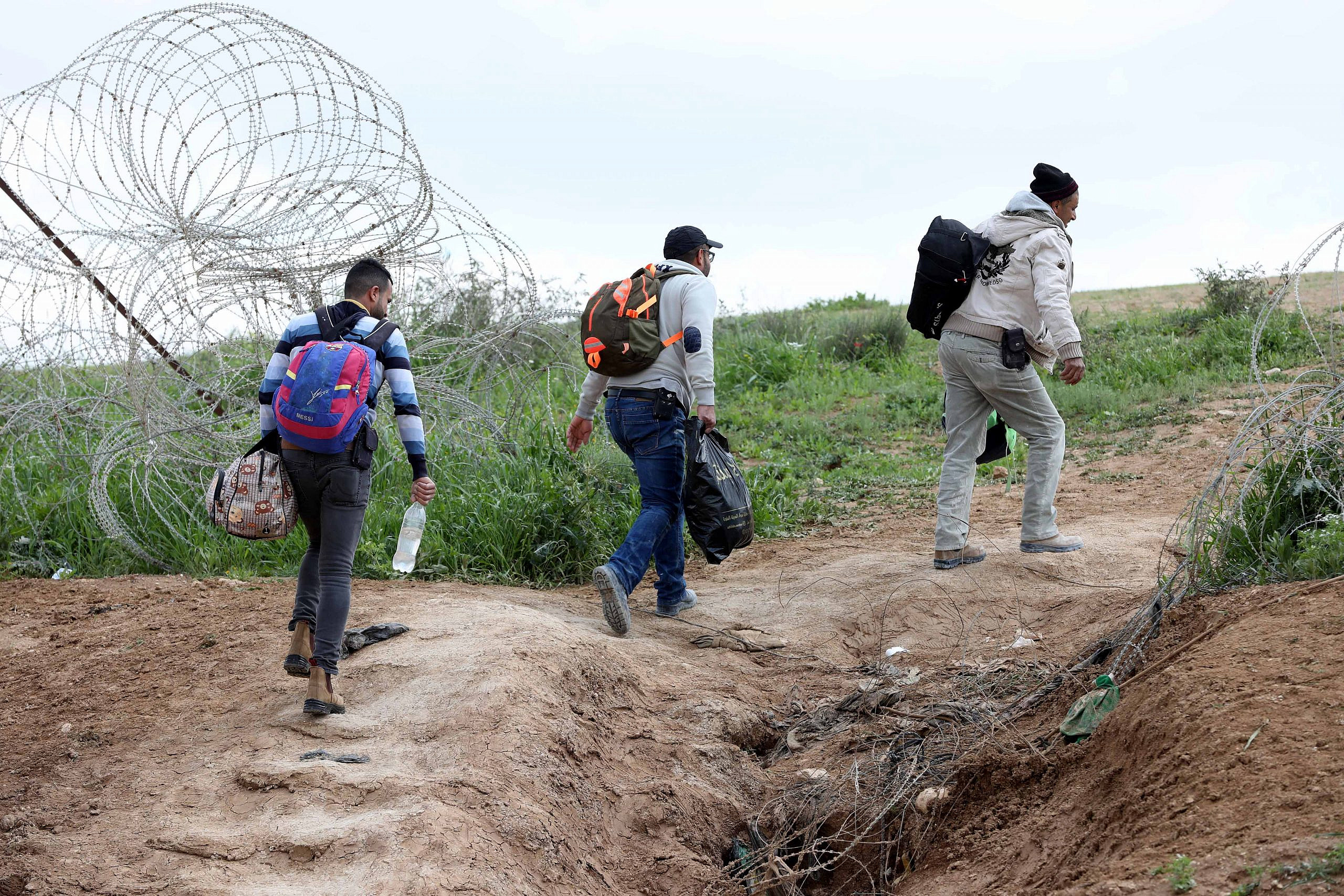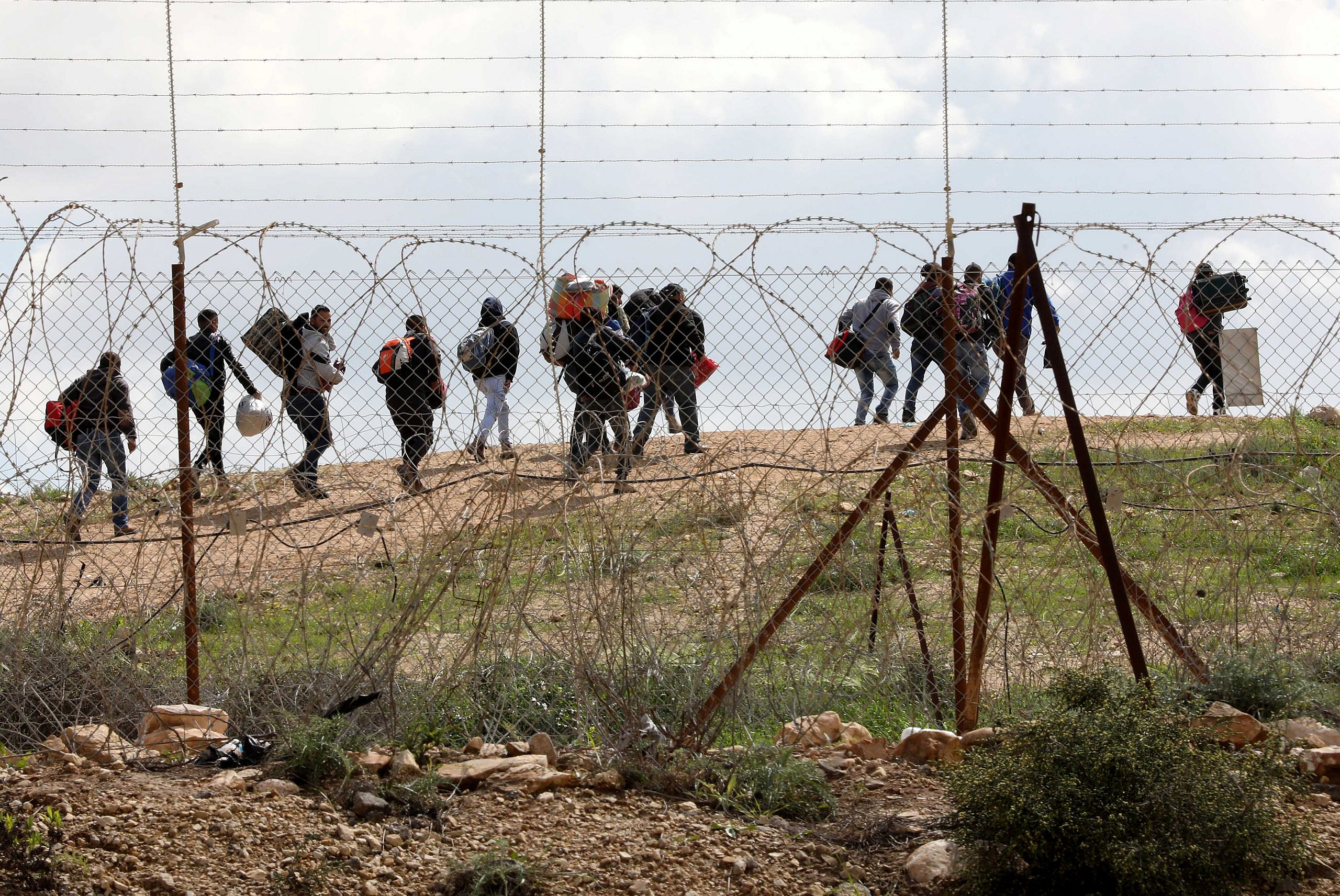It’s a story that even a screenwriter would have a hard time coming up with: fearing that Palestinians employed inside the Green Line will bring the new coronavirus back into the West Bank, Palestinians are reporting breaches in the separation barrier that divides Israel from the occupied territories. Members of the Popular Committees, who for the past two decades have coordinated non-violent demonstrations against the concrete wall and metal fences that make up the barrier, are themselves trying to fix the holes.
Palestinian officials are claiming that the Israeli government is failing to properly maintain the barrier, thereby allowing Palestinian laborers to freely cross into Israel via damaged parts of the metal fence and drainage canals, and return without any kind of medical checks. According to Israeli media, almost two-thirds of all confirmed COVID-19 cases in the occupied territories can be traced back to Palestinian laborers returning from Israel.
In a strange twist, some have even begun to see the barrier as a protective measure, arguing that it has helped prevent the wider spread of COVID-19 across the West Bank, and has enabled the Palestinian Authority to keep the number of cases under control.
Rafaa Rawajbeh, the governor of Qalqilya in the northern West Bank, accuses Israel of intentionally trying to spread the coronavirus in the occupied territories. “It’s a deliberate conspiracy by Israel,” he says. “Why is it that now, of all times, they’re opening gates and drainage canals without deploying soldiers? It’s a clear attempt to harm us and our efforts [at stopping the spread] so that there will be a disease outbreak.”
Rawajbeh is not the only one making this claim, which Israel has forcefully denied, calling it “racist incitement.” An Israeli defense official threatened to reduce freedom of movement for Palestinian security personnel should the “incitement campaign” continue — the same Palestinian officers who have been stationed at checkpoints across the West Bank for weeks to try to prevent a further spread of the disease. In other words, if the PA does not stop accusing Israel of allowing the virus to spread, Israel will interfere with the PA’s ability to combat that virus.
Jenin Governor Akram Rajoub rejects the claim of an Israeli conspiracy aimed at worsening the coronavirus outbreak. If the virus does spread in the occupied territories, he says, Israel will also be affected.
Nonetheless, he believes Israel “wants to embarrass” the PA. “They cannot tolerate the idea that we’ve managed to acquire credit for the Palestinian Authority,” Rajoub says. “They want us to appear weak in front of our own people, as incapable of fulfilling our obligations.”
Aside from weakening the PA, which has so far been relatively successful in preventing the spread of the virus (at the time of writing, there are 308 confirmed cases of COVID-19 and two deaths in PA-controlled areas, compared with 11,868 cases and 117 deaths in Israel), Rajoub believes that Israel’s other main aim is to spare damage to its own economy. This, he says, is why the government is taking “every available measure” to ensure that Palestinian laborers are able to get to their jobs inside the Green Line.

Rajoub says he personally witnessed Israeli soldiers standing idly by as Palestinian laborers entered Israel via breaches in the separation fence. This week, he says, he visited Anin, a Palestinian village in the northern West Bank, along with members of the Emergency Committee, which was established to serve the villages and communities along the barrier. There, he was told by a member of the Palestinian Coordination and Liaison Headquarters that Israeli authorities warned they would shoot anyone who approached the fence. Yet he saw three Palestinians cross the barrier in full view of an Israeli army jeep, while the soldiers watched and did not react.
“They want the workers to infiltrate into Israel and are preventing the Emergency Committee and Palestinian security officials from reaching [the barrier] in order to stop them,” Rajoub says.
The metal fence in the Jenin area of the West Bank is “full of breaches,” Rajoub continues. “This was already happening before the corona[virus], but we weren’t bothered about breaches because it was in our interest for workers to enter Israel. But since the coronavirus, it has become frightening,” he adds.
Israel knew exactly where the fence had been breached even before the coronavirus crisis, according to Rajoub. Nonetheless, Israeli officials have told him that they do not have the budget to fix the damage, or sufficient security forces to guard the barrier. “They could take steps, but they don’t want to,” he says.
The PA has dispatched its forces to Jenin and across the West Bank to prevent Palestinian workers from approaching the fence in order to enter Israel, in coordination with volunteers from the Emergency Committee. PA forces have also set up checkpoints within the West Bank to enforce the Palestinian Health Ministry’s instructions, and also to track the movement of laborers. Prime Minister Mohammed Shtayyeh, responding to Palestinians’ sensitivity around checkpoints, has proposed calling them “Love Checkpoints” or “Compassion Checkpoints.”

Qalqilya Governor Rawajbeh paints a similar picture to Rajoub. “In the Qalqilya area alone, there are more than 50 breaches in 54 kilometers [of fence],” he says. Similarly to what Rajoub witnessed, Rawajbeh describes how drainage canals usually sealed off by iron grills — put in place to keep Palestinians from crossing the Green Line — were opened last Thursday by Israeli soldiers, who then left the canals unguarded.
“Workers infiltrated [Israel] via these canals and there were no Israeli soldiers on the other side,” says Rawajbeh. A Palestinian television crew filming at the site on Thursday used one of these canals to walk over into Israel; in their footage, the reporter is seen standing on the Israeli side of the fence, with no one else around.
“Their excuse is that it was raining on Thursday, which is why they opened the grills,” he says. “But it was hardly raining; they’re lying.”
According to Rawajbeh, past requests by Palestinians to open the canals in order to prevent flooding were only accepted after formal conversations and coordination with the Civil Administration, Israel’s military government in the West Bank. Even then, the grill has been opened for two-to-three hours at most, under constant surveillance by Israeli soldiers on the other side.
On Thursday, Rawajbeh says, Israel delayed the Palestinians’ request to close the grate, meaning that Palestinian workers were able to cross freely in and out of Israel, without any kind of medical or security checks on their return. On Sunday, however, the grates were closed once more.
Riad Abu Hamdeh, 55, a resident of Hableh village south of Qalqilya and manager of a security company, has been volunteering at night with the Popular Committees as they try to prevent Palestinian laborers from entering Israel. “I’m taking care of my village and my people,” he says. “Big, powerful countries are collapsing due to the coronavirus; the [Palestinian] Authority has few resources, and God forbid that the virus should spread here.”
There are four breaches in the fence around his village, and the gate is open, says Abu Hamdeh. The volunteers work in three shifts near the fence, patrolling its length at a distance of 50 meters from each breach. If they get any closer, he says, soldiers will open fire at them.

“As soon as we see workers, we try to persuade them to go home,” explains Abu Hamdeh. “Some of them can be convinced, and some start to argue with us, saying they won’t go into Israel only if we pay their wages.
“We coordinate fully with the Palestinian security forces,” he continues. “If a worker arrives from Israel, an ambulance comes and [the crew] carries out a check. If he tries to go into Israel, they take him home. During my shift, we were able to send back around 20 laborers who were trying to infiltrate into Israel.”
Abu Hamdeh says he saw how soldiers opened the so-called “agricultural gates” in the fence. These gates allow Palestinian farmers to briefly reach their land that was left on the “Israeli” side of the wall, following a thorough examination of their entry permits.
“I saw with my own eyes how soldiers are opening the gates and staying away from them,” he says. “One time we even closed the gate ourselves. The soldiers saw us and yelled at us to go back. We don’t have the keys to the gate or any way to lock it, so we close it with an iron wire, a rope, or anything we have at our disposal.”
Abu Hamdeh describes how he saw Israeli soldiers look on as Palestinian workers walked through. “They asked them one question and did not check them,” he says. “This is a new phenomenon. Only in the days of the coronavirus. Before the coronavirus who would have dared approach the fence? They would have been shot immediately.”
“Before the coronavirus, there were always two-three military jeeps patrolling along the fence,” he continues. “Today there is only one.”
But beyond the soldiers’ strange behavior, and the fact that Palestinians have now become the protectors of the fence, there remains the question of the Palestinian Authority. “One can honestly say that the PA has dealt with the coronavirus crisis better than the Israelis,” says Rajoub, the governor of Jenin.
With its hands tied and lacking resources, the PA has done a better job than Israel, which views itself as a superpower when it comes to science and medicine, and the only democracy in the Middle East, he says. “We have embarrassed Israel. We have made gains that Israel hasn’t. That’s what caused the tension and the problems.”
It’s not all about jealousy, the mayor says. “Their interest is political. Their goal is to present us as weak, submissive, and under Israeli control, our custodian. They are trying to tell us: ‘We are your patrons, we are the educated ones, we are the ones with the means and the abilities, and you are nothing.’’
As the PA’s reputation seemingly improves among West Bank Palestinians, Rajoub says, Israel is more determined to undermine it. “The coronavirus crisis has greatly strengthened the authority’s position among the Palestinian people,” he says. “This is the first time since Oslo that I, as someone who is part of the government, feel that the Palestinian people are praising the security forces and the Palestinian government. [Israel] wants to weaken the PA and undercut the Palestinian people’s morale and belief in its political and security leadership.”
In response to allegations that it opened the drainage canals, the Coordination of Government Activities in the Territories (COGAT), which oversees Israeli policy in the West Bank, expressed regret that “while the State of Israel is helping the Palestinian Authority to better deal with the global fight against the outbreak of the coronavirus, Qalqilya’s governor chooses to incite against Israel.”
COGAT further claimed that in anticipation of rain, the authorities opened the drainage canals in the Qalqilya area to prevent flooding “for the welfare of the Palestinian public living in the area.” The claim that the canals had been opened for unsupervised entry of workers is “false and disconnected from reality,” it added, and this kind of procedure is common during rainy weather and known to Palestinian authorities.
COGAT did not respond to the question of fixing the gaps in the fence.
Regarding allegations that the Israeli army does not oversee the open canals and the breaches in the fence, thus allowing workers to enter, the IDF Spokesperson’s Unit stated that “contrary to the allegations, defense efforts are continuing as usual.”
A version of this article was first published in Hebrew on Local Call. Read it here.


